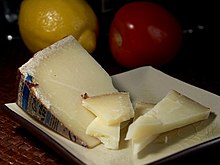This article needs additional citations for verification. (July 2024) |
Pecorino sardo (Sardinian: berveghinu sardu; 'Sardinian ewe's milk cheese') is a firm cheese from Sardinia made from sheep's milk, specifically from the milk of the local Sarda sheep.[1] It was awarded denominazione d'origine (DO) status in 1991 and granted protected designation of origin (PDO) protection in 1996, the year in which this European Union certification scheme was introduced.[2] There are two varieties: Pecorino Sardo Dolce, aged for 20-60 days; and Pecorino Sardo Maturo, which is aged more than 2 months.[3]
| Pecorino sardo | |
|---|---|
 | |
| Other names | Fiore sardo |
| Country of origin | Italy |
| Region | Sardinia |
| Source of milk | Sheep |
| Texture | Hard |
| Certification | DO: 1991 PDO: 1996 |
Pecorino sardo is an uncooked hard cheese, made from fresh whole sheep's milk curdled using calf's rennet. The mixture is salted and poured into moulds. The dolce weights 1.0-2.3 kilograms, while the maturo weighs 1.7-4.0 kilograms. The rind varies from deep yellow to dark brown in colour and encases a paste that varies from white to straw-yellow. The sharpness of the flavour depends on the length of maturation.[3]
Pecorino sardo is not as well known outside Italy as romano or pecorino toscano, although a good deal of pecorino romano is actually made in Sardinia, as Sardinia is within romano's PDO area. Pecorino sardo can be processed further into casu martzu by the introduction of cheese fly maggots.
See also
editMedia related to Pecorino sardo at Wikimedia Commons
- List of Italian cheeses
- List of Italian DOP cheeses – food with protected designation of origin status
- Sardo – grating cow's milk cheese, an Argentine cheese
- Pecorino – hard Italian sheep's milk cheese
References
edit- ^ "Sardinian Pecorino Cheese". Italian Tourism Official Website. 2015-03-23. Archived from the original on 21 November 2015. Retrieved 2021-10-25.
- ^ ‘Pecorino sardo Dop’, SardegnaAgricoltura, (Regione Autonoma della Sardegna, 2009).
- ^ a b "SardegnaAgricoltura: Pecorino Sardo DOP". www.sardegnaagricoltura.it (in Italian). Retrieved 2024-09-11.